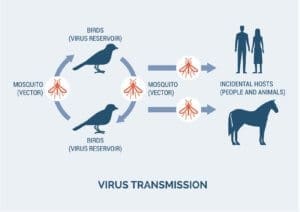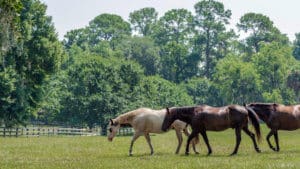West Nile Virus (WNv)
 West Nile Virus (WNv) is traditionally found in parts of Asia, eastern Europe, Africa, and the Middle East. The virus was first detected in the United States in 1999 in New York City. In Jackson County, WNv was first detected during routine mosquito trapping and disease testing in 2005. The virus has been detected in the county nearly every year since then.
West Nile Virus (WNv) is traditionally found in parts of Asia, eastern Europe, Africa, and the Middle East. The virus was first detected in the United States in 1999 in New York City. In Jackson County, WNv was first detected during routine mosquito trapping and disease testing in 2005. The virus has been detected in the county nearly every year since then.
In nature, birds are typically the primary reservoir host for WNv. When a mosquito bites an infected bird, it can spread the virus to other birds, people, and mammals, such as horses, that it bites. People, horses, and other mammals are “dead end hosts”, meaning they cannot spread the virus any further. WNv is usually associated with mild flu-like symptoms but, in rare cases, it can cause encephalitis, or inflammation of the brain. WNv can be fatal when this occurs.
Western Equine Encephalitis

Western equine encephalitis (WEE) is a viral disease that circulates naturally in birds and can be transmitted to horses and people through the bite of an infected mosquito. Most human cases are associated with a sudden onset of symptoms like fever, headache, muscle stiffness, and vomiting. However, WEE can potentially cause swelling of the brain, resulting in numerous long-lasting neurological conditions or death. There is no cure for WEE in humans so supportive care is the only option once infection occurs.
In horses, the mortality rate for WEE infections is about 20-40%. Symptoms include lethargy, staggering, recumbency, walking in circles, seizures, and various other neurological conditions. There is no cure for WEE in horses, but a preventative vaccine is available. Good vector control practices are also crucial for preventing WEE. Practices such as using repellents, keeping horses inside at night when mosquitoes are most active, and eliminating mosquito breeding sources will help reduce WEE risk.
Canine Heartworm
 Canine heartworm is a very serious and potentially fatal disease caused by worms that live inside the heart, lungs, and blood vessels of affected animals. This can lead to lung disease, heart failure, and damage to other organs. The Western treehole mosquito, Aedes sierrensis, is a well-known carrier of heartworms. This species is abundant in Jackson County and is usually associated with oak and madrone forests. Oak and madrone trees have a high propensity for forming cavities, or “treeholes”, that can hold water and provide abundant larval habitat for mosquitoes. These mosquitoes play a key role in the lifecycle of heartworms. Animals that are infected with heartworms will have microscopic juvenile worms, known as microfilaria, circulating in their bloodstream. When a mosquito bites an infected animal, it will pick up these juvenile worms and is then able to spread those worms to other animals that it bites.
Canine heartworm is a very serious and potentially fatal disease caused by worms that live inside the heart, lungs, and blood vessels of affected animals. This can lead to lung disease, heart failure, and damage to other organs. The Western treehole mosquito, Aedes sierrensis, is a well-known carrier of heartworms. This species is abundant in Jackson County and is usually associated with oak and madrone forests. Oak and madrone trees have a high propensity for forming cavities, or “treeholes”, that can hold water and provide abundant larval habitat for mosquitoes. These mosquitoes play a key role in the lifecycle of heartworms. Animals that are infected with heartworms will have microscopic juvenile worms, known as microfilaria, circulating in their bloodstream. When a mosquito bites an infected animal, it will pick up these juvenile worms and is then able to spread those worms to other animals that it bites.
Positive heartworm cases are reported by Jackson County veterinarians every year. It is highly recommended that dogs be routinely tested for this disease and that proper preventative measures are taken.
For more information about these diseases, please visit these sites:
